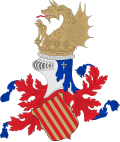You can help expand this article with text translated from the corresponding article in Spanish. (April 2024)Click [show] for important translation instructions.
|
Villar del Arzobispo El Villar | |
|---|---|
| Coordinates: 39°43′50″N0°49′32″W / 39.73056°N 0.82556°W | |
| Country | |
| Autonomous community | |
| Province | Valencia |
| Comarca | Los Serranos |
| Judicial district | Llíria |
| Government | |
| • Alcalde | Eduardo Gómez Martínez (2009) (PSOE) |
| Area | |
• Total | 40.7 km2 (15.7 sq mi) |
| Elevation | 520 m (1,710 ft) |
| Population (2025-01-01) [1] | |
• Total | 3,862 |
| • Density | 94.9/km2 (246/sq mi) |
| Demonym | Villarenco/a |
| Time zone | UTC+1 (CET) |
| • Summer (DST) | UTC+2 (CEST) |
| Postal code | 46170 |
| Official language(s) | Spanish |
| Website | Official website |
Villar del Arzobispo (Valencian: El Villar) is a municipality in the comarca of Los Serranos in the Valencian Community, Spain.


